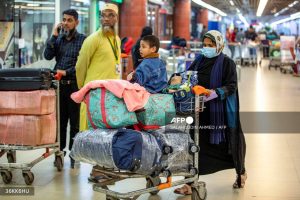 The first group of Bangladeshis airlifted home from Lebanon described the constant fear of living in a city shaken by explosions. Late Monday, the initial 54 of approximately 1,800 Bangladeshis seeking to escape the troubled Mediterranean nation returned to Dhaka on a government-backed flight.
The first group of Bangladeshis airlifted home from Lebanon described the constant fear of living in a city shaken by explosions. Late Monday, the initial 54 of approximately 1,800 Bangladeshis seeking to escape the troubled Mediterranean nation returned to Dhaka on a government-backed flight.
Many of those returning have left behind long-established lives in Lebanon for an uncertain economic future back home. Bangladesh’s foreign ministry estimates that between 70,000 and 100,000 nationals work in Lebanon, primarily as laborers or domestic workers.
For 68-year-old Abul Kashem, who had lived in Beirut for nearly four decades, the recent barrage of air strikes was unlike anything he had previously experienced. “I have never seen any war like this,” he said, recalling his work at a gas station that has since been reduced to rubble. “Everything around the fuel pump where I worked has been destroyed,” he added, expressing relief after arriving exhausted on a plane chartered by the UN’s International Organization for Migration.
Israel has significantly intensified its air campaign against Hezbollah in Lebanon over the past month, following a ground offensive aimed at pushing the group back from its northern border. In retaliation, Hezbollah has launched thousands of projectiles into Israel, displacing tens of thousands of Israelis.
The Bangladeshi workers, striving to send money back home to their families, found themselves trapped in a conflict they never anticipated. “Five buildings near my residence were brought to the ground,” said Mohammad Hossain, 28, who returned with his wife and one-year-old child. “The attacks were so intense,” he remarked. “The cars are almost melting.”
Nearly a month of continuous conflict has claimed at least 1,489 lives in Lebanon, according to an AFP tally based on Lebanese health ministry figures. Reports indicate that at least five Bangladeshi citizens were among those injured, while thousands have fled border areas into the interior of Lebanon.
“I feel very good after returning to my home country,” Hossain said, as he was welcomed back by relatives, some in tears. “When the plane left the airport in Lebanon, I immediately felt peace in my mind.”
Those returning now face the challenge of finding work in Bangladesh, which is undergoing a political transition after a student-led revolution ousted former leader Sheikh Hasina on August 5. The loss of income will be felt by their families in a country where personal remittances account for over five percent of GDP, according to the World Bank.
The Bangladeshi foreign ministry, which is covering the costs of the flights, announced that 65 more citizens are scheduled to return on Tuesday. Ruma Khatun, 30, who initially fled to Beirut seeking refuge, stated she no longer felt safe there and was among the first to sign up to leave. “The situation is very bad,” she said. “When we were taking off from Lebanon… we heard the sound of bombing.”

